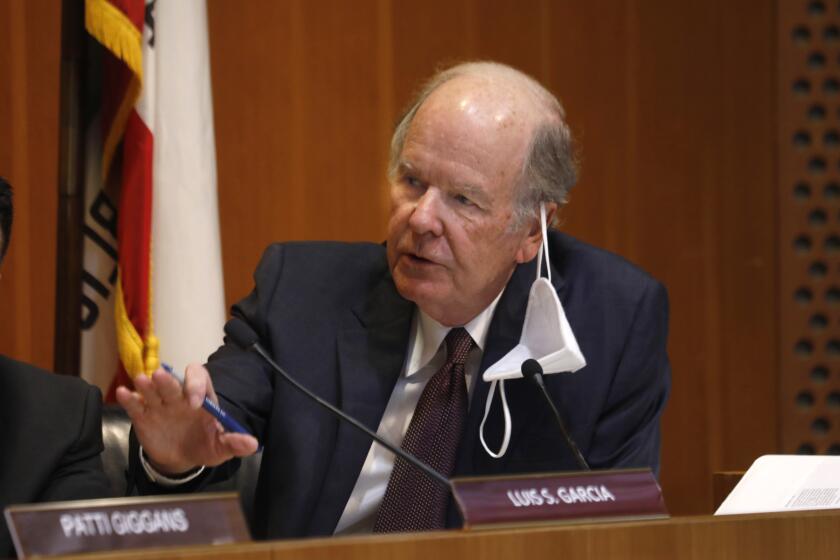Lawmakers talked of overhauling the state’s embattled medical board. Did they?

- Share via
SACRAMENTO — Amid increasing criticism that the state’s medical board is failing to discipline bad doctors, Gov. Gavin Newsom signed a bill Thursday with a handful of long-sought reforms approved by lawmakers. But critics say those changes don’t address their main concern — that the Medical Board of California is too lenient in its punishment of negligent doctors.
Newsom’s signature on Senate Bill 806 was never in question. The governor had to sign the bill in order for the medical board to continue to exist in a process known as a sunset review, which typically occurs every four years. During those reviews, lawmakers assess how state boards are functioning and include what changes are needed in legislation sent to the governor.
Did this year’s bill do that?
“Yes and no,” said Robert Fellmeth, executive director of the Center for Public Interest Law at the University of San Diego. “The big thing it doesn’t do is change the board to a public majority.”
Reformers have wanted to alter the balance of the oversight board — from a physician majority to a public member majority — in hopes of arriving at more patient-friendly decisions in disciplinary cases. Although the bill initially proposed that change, it was removed amid intense lobbying by the California Medical Assn., which also batted back calls for significantly raising fees on medical licenses to beef up enforcement.
SB 806 raises licensing fees 8%, which the California Medical Assn. said was a “major victory” for the doctors’ lobbying association because lawmakers initially proposed a 50% increase.
“We’ve seen time and again the doctors’ lobby stand in the way of reforms that would prevent bad doctors from continuing to practice,” said Carmen Balber, executive director of the patient advocacy group Consumer Watchdog. “This bill doesn’t do anything to stop the board’s complicity in those efforts. We’re really disappointed. This bill was a huge missed opportunity.”
One public member of the Medical Board of California, Eserick “TJ” Watkins, has become a frequent critic of its oversight this year, telling lawmakers he has lost faith in the board after seeing patient safety concerns continually ignored.
Under SB 806, the director of the Department of Consumer Affairs will appoint an enforcement monitor to oversee its disciplinary actions and handling of complaints by March 1, 2022. The monitor would then report its findings to the Legislature.
Patient advocates welcomed additional oversight but said they were skeptical it would bring real change, noting that Department of Consumer Affairs Director Kimberly Kirchmeyer, who would appoint someone to fill the position, is a former executive director of the medical board. Late changes to the bill limit who can be appointed enforcement monitor, excluding anyone who is part of an “organization that represents patient or physician and surgeon interests” as a member of a professional association, lobbyist, patient advocate or someone who has appeared before the Legislature.
Fellmeth and Balber said the strict limits on who can be appointed enforcement monitor will make it difficult to find someone qualified.
“So, essentially it’s a professional do-nothing,” Fellmeth said.
The California Medical Assn., however, said the enforcement monitor will help ensure patients’ voices are being heard by the medical board and their concerns are addressed.
“The old enforcement system was broken, and the original fee increase proposal would have further entrenched that broken system,” said Anthony York, a spokesman for the doctors’ lobbying group. “We hope the reforms and increased fees passed this year will lead to changes at the Medical Board that protect patients and ensure good physicians can practice medicine without fear of opportunistic trial lawyers looking to turn a profit through frivolous and predatory lawsuits.”
A Times investigation found that the Medical Board of California has consistently allowed doctors accused of negligence to keep practicing and harming patients, in some cases leaving them dead, paralyzed, brain-damaged and missing limbs. The state board allowed some doctors to keep seeing patients even after accusing them of lying to conceal significant medical errors.
The Times’ analysis showed the medical board received nearly 90,000 complaints against doctors in the last decade from patients, nurses, fellow physicians and others. Board investigators substantiated 3,100 of those, resulting in disciplinary action that mostly consisted of probation or a letter of reprimand. Only 439 — less than 0.5% of the original complaints — ended in licenses being revoked.
In a legislative hearing, Assemblyman Evan Low (D-Campbell), chair of the Assembly Business and Professions Committee, tasked with reviewing the medical board, called those numbers “either a statistical anomaly or a complete failure of the medical board to take action to protect every Californian.”
Low said that the bill doesn’t address many of the issues facing the board but that “the board is certainly not off the hook.”
The bill signed by Newsom requires the medical board to return to the Legislature sooner for its regular review, reducing that timeline from the typical four-year cycle to two years. Next year, lawmakers could readjust licensing fees again if needed.
More to Read
Sign up for Essential California
The most important California stories and recommendations in your inbox every morning.
You may occasionally receive promotional content from the Los Angeles Times.














